- Home
- Haruki Murakami
Underground: The Tokyo Gas Attack and the Japanese Psyche Page 8
Underground: The Tokyo Gas Attack and the Japanese Psyche Read online
Page 8
It’s strange, you know, back in the hospital with everyone around me in a blind panic, I didn’t feel in the least horrified. I was so calm and collected. If someone had made a joke about sarin, I wouldn’t have cared in the least. That’s how little it meant to me. That summer I began to forget that there had even been a “Tokyo gas attack.” I’d read something in the newspaper about a lawsuit for damages and I’d think, “Ah yes, that again,” as though it had nothing to do with me.
I’ve worked in Tokyo for twelve years, I know all about its peculiarly settled ways. Ultimately, from now on I think the individual in Japanese society has to become a lot stronger. Even Aum, after bringing together such brilliant minds, what do they do but plunge straight into mass terrorism? That’s just how weak the individual is.
“Looking back, it all started because the bus was two minutes early”
Kenji Ohashi (41)
Mr. Ohashi is married with three children and has worked at a major car dealership for twenty-two years. He is presently Business Department head at their service center in Ohta Ward, southeast Tokyo.
At the time of the Tokyo gas attack, the service center was still unfinished and he was working from a temporary office to the west in Nakano Honancho, Suginami Ward. Mr. Ohashi was exposed to sarin on his commute to this office, while traveling on the Marunouchi Line.
An old hand at the car-repair business, Mr. Ohashi stands in front of the shop and deals directly with the customers. An experienced technician, he is a real working-man, with short hair and a solid build. He’s not the talkative type, and speaks slowly and thoughtfully about the gas attack.
He still suffers from particularly severe aftereffects, but he has also joined a victims’ support group and actively participates in its campaigns. He is trying to organize a self-help network to link all the individual sufferers. The hour and a half he spent talking to me must have given him an excruciating headache. I can only offer my apologies and my sincere thanks for his cooperation.
When I used to commute to Nakano, I’d go from Koiwa via Japan Railways to Yotsuya Station. From home I’d catch the bus or cycle to Koiwa Station; well, probably more often it was the bus.
On the day of the gas attack I left the house as usual just after 7:00. But as luck would have it, the bus was about two minutes early. It was always late, but for once it was ahead of schedule. I ran for the stop but didn’t make it in time, so I had to catch the next bus at 7:30 instead. By the time I reached Yotsuya I had already missed two trains on the subway. Looking back, it all started because the bus was two minutes early. My timing has never been so bad! Until then I’d traveled back and forth like clockwork.
I always went for the third car from the front on the Marunouchi Line. That way you get the best view from the Yotsuya Station platform. Looking out past the roofline you can see the Sophia University soccer field, it’s like a breath of fresh air! That day, however, the third car was ridiculously empty. It’s never like that. Yotsuya is so crowded, you can never get a seat. You just get on and hope for a seat later. So I knew then something was up.
As soon as I got on, I noticed two people in odd postures behind me. A man hunched over in his seat, nearly falling off, and a huddled woman, head down and sort of curled up. And then there was this really strange smell. At first I thought there must be some drunk making the place stink, like when a drunk throws up. It wasn’t a sharp smell, it was a little sweet, like something rotten. Not like paint thinner, either. We do paint jobs, too, so I know what thinner smells like. It didn’t make your nose sting like that.
Well, I got a seat, so I was prepared to put up with a little smell; and once I’d sat down I soon closed my eyes and fell asleep. I usually read a book on the train, but it was Monday and I was sleepy. Still, I didn’t fall asleep, really, just closed my eyes and half-dozed. Sounds still reached me, so when I suddenly heard the announcement, “This station is Nakano-sakaue,” I snapped awake, like a reflex action, jumped up, and left the train.
Everything was dim. The lights on the platform were faint. My throat was parched and I was coughing; a really bad, chesty cough. There’s a water cooler by a bench at the end of the station, so I thought I’d better go and rinse my mouth. That’s when I heard the shouting: “Someone’s fainted!” It was this tall young salaryman. When I looked back inside, I saw the man in the car had fallen right over, parallel to the seats.
But I didn’t feel too good myself. I went to the water cooler and gargled. My nose was running and my legs were shaky. It was hard to breathe. I just plunked myself down on a bench. Then, maybe five minutes later, they carried out on a stretcher the man who’d fainted, and the train started off again.
I didn’t have the foggiest idea what had hit me. Only everything had gone dark before my eyes. My lungs were wheezing like I was running a marathon and the whole lower half of my body was cold and trembling.
Altogether maybe five or six passengers were brought up to the station office. Two of them on stretchers. But the station attendants hadn’t a clue either. They were asking us what had happened. The police arrived about half an hour later, and predictably started questioning us. It was really painful, but I made the effort to spell things out as best I could. Someone had fainted and I was afraid if I lost consciousness I’d be done for. That’s why they were trying to keep us talking, I thought, so I forced myself to speak.
Meanwhile, during alf this, the station attendants themselves began to feel sick. Their sight was going. We’d been in that office for at least forty minutes, everyone breathing the same air. We probably should have gone above ground earlier.
So we went upstairs. The fire department had set up a temporary relief shelter in an alleyway. “Just sit here for now,” they told us. But it was so, so cold, I couldn’t stay sitting there, just a thin plastic sheet on the ground. Lie down and you’d freeze. It was still March, after all. There was a bicycle parked there, so I propped myself against that. “Mustn’t pass out,” was all I could think. Two people did lie down, but the rest did like me. I tell you, it was damn cold. We were forty minutes in the station office and twenty minutes out there. A whole hour had gone by and none of us had received any treatment.
We couldn’t all go in the ambulance, so I was taken by police van to Nakano General Hospital. There they laid me out on a bench while they examined me. The results weren’t good, so they put me on intravenous straightaway. I’d heard reports in the police van over the radio about the effects of poisoning and so on. That’s when I realized I’d been poisoned.
At this point, apparently, they knew it was sarin at Nakano General, but there we were still wearing our sarin-saturated clothes. Soon the hospital staff were complaining of eye trouble too. All through the morning my body was like ice. Even with an electric blanket, I was shivering. My blood pressure was up to 180. Ordinarily I run in the 150s tops. Still, I wasn’t worried, just puzzled.
I was in the hospital for twelve days: vicious headaches the whole time. No painkiller worked. I was in agony. The headaches would come in waves all day, receding then getting stronger. I also ran a high fever for two days; as high as 40° C [104° F].
I had cramps in my legs and trouble breathing for the first three or four days. It was like there was something stuck in my throat. Excruciating. My eyes were so bad I’d look outside and see no light at all. Everything was a blur.
They kept me on intravenous for five days. On the fifth day, my Cholinesterase level had returned to near normal, so they detached the drip. * My pupils slowly recovered, but whenever I focused on anything I felt a sharp shooting pain at the back of my eyes, like I was being stabbed with a pick.
They finally discharged me on March 3 and I took a month off work to recuperate at home. I still suffered from splitting headaches. And with my legs so wobbly, I was bound to fall arid hurt myself while commuting—what they call “secondary injury.”
First thing in the morning my head would hurt. It was like a killer hangover. My head throbbed
with each pulse, every heartbeat, and it kept up relentlessly. Still, I didn’t take any medicine. I simply buckled down and took the pain. Having absorbed sarin, the risk of taking the wrong medicine was worse than taking nothing, so I avoided all headache remedies.
I took off all of April, then put in an appearance at our newly constructed Showajima Center after the early May holidays, and started back on the job. We were arranging desks, connecting computers, straight through every day until late at night. I know I overdid it. My head still hurt. It got worse when the June rains set in. Every day it felt like I had some massive weight crushing my skull. And I still got shooting pains when I tried to look at anything.
I was afraid to commute again. I’d board the train and see the door slide shut before my eyes, and in that very instant my head would seethe with pain. I’d get off and go through the ticket barrier, thinking, “I’m okay,” and the weight would still be there in my head, bearing down. I couldn’t concentrate on anything. If I talked for more than an hour my head would be killing me. It’s still that way now. In mid-April when I filed a police report, the effort wore me out.
Then, after a week’s vacation in August, I felt a noticeable change. I was fine on the train. My headaches weren’t so bad. Maybe the time away from work eased the tension. The first few days back at work were great, but a week later I was back to square one. Headaches again.
One day in August it took me three hours to get to work. I had to stop off all along the route and rest until the pain subsided; but the moment I was back on board a train it would flare up again, so I’d have to rest—over and over again. It was 10:30 by the time I reached the office!
I went to see a psychologist, Dr. Nakano, at St. Luke’s Hospital. I related my case history and symptoms up to that point, and he said, “Absolutely hopeless! It’s suicidal the way you’re working!” He didn’t mince his words. After that I went to him twice a week for counseling. I took tranquilizers, sleeping pills—finally I could sleep at night.
I ended up taking another three months off work, all the time keeping up the counseling and the medicine. You see, I had what’s called posttraumatic stress disorder [PTSD]. Examples range from returning Vietnam War veterans to victims of the Kobe earthquake. It comes from severe shock. In my case, for four months after the gas attack, I’d pressured myself into working all hours, overtaxing my body, which piled on the stress even more. It was only thanks to my summer vacation that the tension snapped.
A complete cure of PTSD is apparently very rare. Unless you clear away all those memories, the psychological scars remain. But memories aren’t so easily erased. All you can do is try to reduce stress and not overwork.
Commuting is still hard. One hour on the train from Koiwa, then change at Hamamatsucho to the monorail, gradually my head gets weighed down. Okay, I’m sure I look all right, but then no one understands this pain, which makes it doubly hard for me at work. My boss is decent enough, though, he sympathizes: “If I’d caught a different train,” he says, “it could’ve been me.”
For a while after the gas attack, when I was sleeping at the hospital, I had terrible nightmares. The one I remember best was a dream in which someone pulled me out of my bed next to the window and dragged me around the room. Or I turned and suddenly saw someone standing there who’s supposed to be dead. Yeah, I often met dead people in my dreams.
I used to have dreams in which I was a bird flying in the sky, but then I’d get shot down. An arrow or a bullet, I don’t know. I’m lying there wounded on the ground and I get trampled to death—dreams like that. Happy at first, flying through the sky, then a nightmare.
About the criminals themselves, what I feel goes beyond hatred or anger. Anger is too easy. I just want them dealt with as soon as possible—that’s all I have to say.
I interviewed Mr. Ohashi in early January 1996, but met him again at the end of October. I was curious what progress he’d made. He was still plagued by headaches and a feeling of lethargy.
At the same time, his most immediate problem is that he has been relieved of most of the work he used to do at his company. The week before this second interview, his boss had called him into his office and said, “For the time being, why don’t you take it a little easier and do work that doesn’t require such intense detail, so that you can get better?” After discussions, it was decided that the senior department head should take over Mr. Ohashi’s duties as Business Department line director.
Nevertheless, Mr. Ohashi’s complexion looked much healthier. He now travels from his house in Edogawa Ward to Dr. Nakano’s clinic in central Tokyo by motorcycle (trains still give him headaches). He came to the interview by bike. He seemed more youthful and full of life than before. He was even smiling. But as he himself says, pain is invisible, and known only to the sufferer.
Since February I’ve been getting into the office by 8:30, coming home around 3:00. I have headaches all day. They come in waves, mounting and receding. It hurts right now and will no doubt last a long time. It feels like a heavy weight bearing down, covering my head, like a mild hangover, all day, every day.
For a week or two in late August to early September, the pain was especially bad. I just got by with headache tablets and ice packs. My boss told me to just work mornings and go home, but the headaches haven’t gotten any better. It’s chronic, but I’m used to it. It’s over here on the left now, but other days it comes on the right or all over …
This year I’ve been getting a processing system up and running for making car-repair estimates based on my twenty years’ experience. If only the computer screen were monochrome green—I find that three or four colors make my eyes hurt. Focusing is also difficult. If I’m looking one way and someone calls me and I turn around suddenly, it hits me like a sledgehammer. This happens all the time—a shooting pain in the back of my eyes. As if I were being skewered. When it’s very bad there have been times I’ve contemplated suicide. I almost think I’d be better off dead.
I’ve been to eye specialists, but they can’t find anything wrong. Only one doctor told me, “Farmers sometimes get this, too.” Apparently mixing up organic fertilizers damages their nerves, causing the same symptoms.
But here it is the end of summer, and my head is still killing me. The company still lets me go into work, but I’ve been relieved of my managerial responsibilities. My boss says that a high-stress workplace would be bad for me physically, but the result of this special treatment is that it’s extremely hard for me to perform like a businessman in his prime. I’m grateful they want me to take it easy, and after the gas attack I did work harder than usual. Not wanting to inconvenience the company, I kept my headaches a secret and, well, overworked, but I’m not the type of person who can just sit idly by.
To be honest, my present position leaves me twiddling my thumbs. They even moved my desk. I go to the office and there’s nothing much for me to do. I’ll sit by myself and tally up slips, work that anyone could do. But having gained all this experience up to now, I can’t very well not work.
Sometimes I think up different proposals on my own, regardless of whether they’ll work or not. Realistically, though, not knowing if this pain will ever go away completely, or how long I’ll have to keep living like this, I can’t see any future. I’m working now from morning until noon and then I’m exhausted.
Because of my accident benefits, they’ve had to cut my bonus to 2.5 million yen a year, which is quite a squeeze financially. Bonuses are really important to a salaryman. They barely make up for the month-to-month shortcomings. I just had a new house built and there’s a thirty-year loan to pay back. I’ll be 70 then.
I know I don’t appear to be in constant pain, but imagine wearing a heavy stone helmet, day in, day out… I doubt it makes much sense to anyone else. I feel very isolated. If I’d lost an arm, or was reduced to a vegetable, people could probably sympathize more. If only I’d died then, how much easier it would have been. None of this nonsense. But when I think of my family, I h
ave to go on …
“That day and that day only I took the first door”
Soichi Inagawa (64)
Mr. Inagawa’s gray hair is thinning slightly but combed neatly in place. His cheeks are red, though he’s not especially plump. More than ten years ago he became diabetic and has been watching his diet ever since. Yet he still has his drinking companions and is especially fond of sake.
He wears a well-pressed charcoal gray three-piece suit and speaks clearly and succinctly. You can tell he prides himself on his working life up to now, having worked throughout Japan’s postwar decades.
He was born in Kofu, a provincial city in the mountains, two hours west of Tokyo. After graduating from a vocational high school for electricians, he joined a Tokyo construction company in 1949. In time he moved from the construction site to an office and, at 60, he retired as Business Division director. He had other job offers, but “all of a sudden I got fed up with bosses.” He and two friends his age decided to set up their own business dealing in lighting equipment. The office is located directly above Shin-nakano Station.
Business is steady though not especially busy, “But it still feels great not having to answer to anyone else.” He and his wife live in Ichikawa, across Tokyo Bay to the east in Chiba Prefecture. Their two children have left home and they have three grandchildren, the youngest born a month after the gas attack.
He always carries two lucky charms his wife gave him—not that he really believes in that sort of thing …
I leave the house at 7:25 and get to work by 8:40. Office hours are supposed to start at 9:00, but since it is my company I’m not so strict about it.
On March 20 I got a seat from Ochanomizu. I changed at Shinjuku to the Marunouchi Line, and again I managed to get a seat. I always travel in the third car from the front.

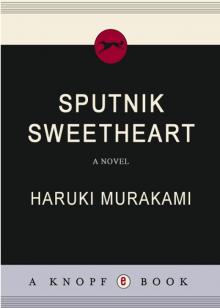 Sputnik Sweetheart
Sputnik Sweetheart Dance Dance Dance
Dance Dance Dance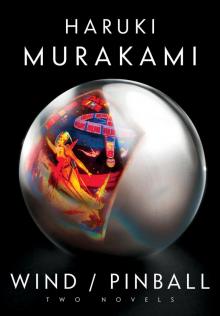 The Wind (1) and Up Bird Chronicle (2)
The Wind (1) and Up Bird Chronicle (2) Blind Willow, Sleeping Woman
Blind Willow, Sleeping Woman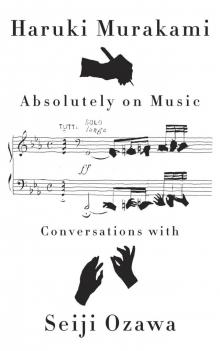 Absolutely on Music: Conversations With Seiji Ozawa
Absolutely on Music: Conversations With Seiji Ozawa Norwegian Wood
Norwegian Wood South of the Border, West of the Sun
South of the Border, West of the Sun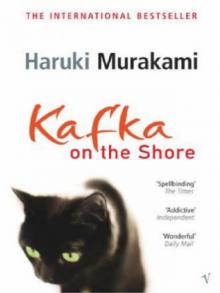 Kafka on the Shore
Kafka on the Shore Men Without Women
Men Without Women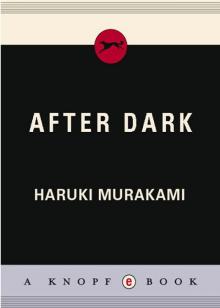 After Dark
After Dark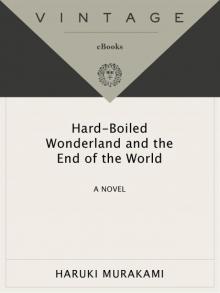 Hard-Boiled Wonderland and the End of the World
Hard-Boiled Wonderland and the End of the World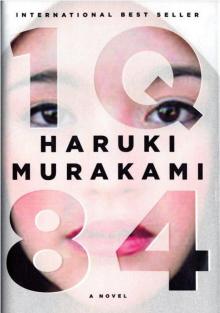 1q84
1q84 The Wind-Up Bird Chronicle
The Wind-Up Bird Chronicle Underground: The Tokyo Gas Attack and the Japanese Psyche
Underground: The Tokyo Gas Attack and the Japanese Psyche Vintage Murakami
Vintage Murakami The Elephant Vanishes: Stories
The Elephant Vanishes: Stories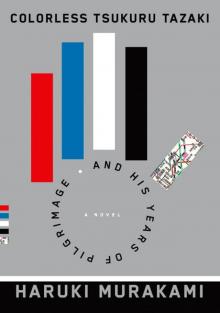 Colorless Tsukuru Tazaki and His Years of Pilgrimage
Colorless Tsukuru Tazaki and His Years of Pilgrimage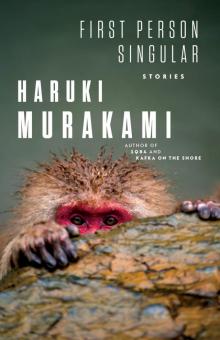 First Person Singular
First Person Singular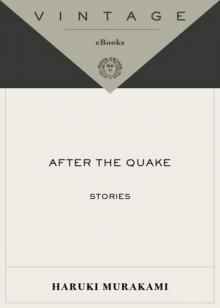 After the Quake
After the Quake A Wild Sheep Chase
A Wild Sheep Chase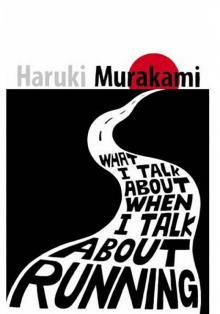 What I Talk About When I Talk About Running
What I Talk About When I Talk About Running Birthday Girl
Birthday Girl The Elephant Vanishes
The Elephant Vanishes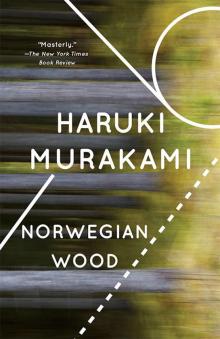 Norwegian Wood (Vintage International)
Norwegian Wood (Vintage International)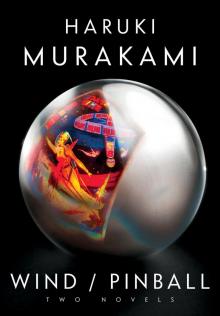 Wind/Pinball
Wind/Pinball Norwegian Wood Vol 1.
Norwegian Wood Vol 1. Underground
Underground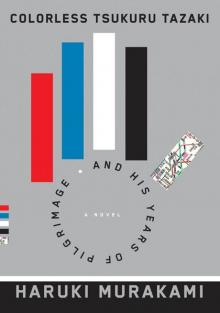 Colorless Tsukuru Tazaki and His Years of Pilgrimage: A novel
Colorless Tsukuru Tazaki and His Years of Pilgrimage: A novel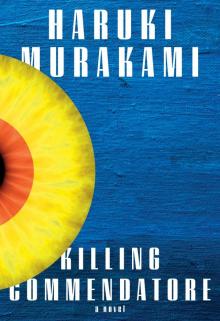 Killing Commendatore
Killing Commendatore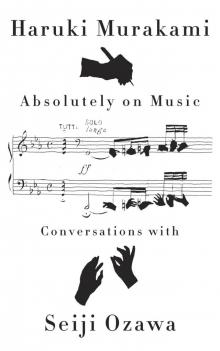 Absolutely on Music
Absolutely on Music